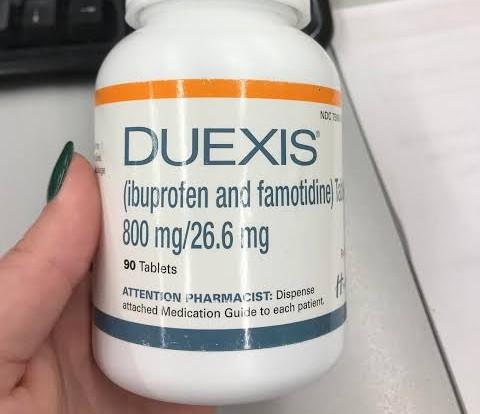Duexis: Frequently Asked Questions (FAQ)

What is Duexis?
Duexis contains a combination of famotidine and ibuprofen. Famotidine is a histamine blocker. Famotidine works by decreasing the amount of acid the stomach produces. Ibuprofen is a nonsteroidal anti-inflammatory drug (NSAID). Ibuprofen works by reducing hormones that cause inflammation and pain in the body.
Duexis is a combination drug. Ibuprofen treats the symptoms of arthritis. Famotidine helps reduce the risk of ulcers in the stomach or intestines that can be caused by the long-term use of ibuprofen.
How long does it take for Duexis to kick in?
It may take up to two weeks of taking this drug regularly until you get the full benefit. Take this medication regularly to get the most benefit from it. To help you remember, take it at the same time each day. Tell your doctor if your condition persists or worsens.
What are the benefits of taking Duexis?
Duexis offers the powerful symptom relief you expect from your prescription- strength medicine (2400 mg ibuprofen/day).
Nonsteroidal anti-inflammatory drugs (NSAIDs) like ibuprofen, are the most commonly used drugs to ease the inflammation, pain, and stiffness that come with osteoarthritis (OA) and rheumatoid arthritis (RA). You may be familiar with ibuprofen as a trusted and effective pain reliever. But ibuprofen comes in different forms and strengths.
Over-the-counter (OTC) ibuprofen is available at lower doses than prescription ibuprofen (the OTC daily dosage limit is 1200 mg).
Prescription-strength ibuprofen can relieve BOTH arthritis pain and inflammation—dose strengths available OTC only help with pain.
In a study of patients with OA, ibuprofen (800 mg 3 times daily) was shown to help patients feel less joint pain*.
*This study did not include Duexis. The 6-week study of 809 adults with OA of the knee or hip assessed patient response to therapy, disease status, and pain walking on a flat surface (primary study endpoints).
Duexis can provide OA and RA symptom relief, including pain and inflammation, when treatment with a medication is preferred over surgery.
Duexis offers relief without putting you at risk for dependence and addiction, unlike opioids.
Duexis is a prescription-strength ibuprofen with the built-in stomach protection of famotidine—giving you powerful relief with about half the risk of getting stomach ulcers vs ibuprofen alone.
Duexis was studied mostly in patients who were less than 65 years old and did not have a history of stomach ulcers. These patients required NSAID treatment for chronic conditions such as OA and RA. In these studies, patients taking Duexis had a lower risk of developing stomach ulcers than those taking ibuprofen alone during the 6-month study period.
What are the important things to remember when taking Duexis?
Duexis can cause an increased risk of a heart attack or stroke that can lead to death. This risk may occur early in treatment and may increase with longer use and with increasing doses of medicine containing NSAIDs.
Duexis can cause an increased risk of bleeding, ulcers, and tears (perforation) of the esophagus, stomach, and intestines. These events can occur at any time during use, without warning symptoms, and may cause death. Elderly patients and patients with a history of ulcer disease or stomach or intestine bleeding are at greater risk for getting an ulcer or bleeding.
You should take Duexis exactly as prescribed, at the lowest dose possible and for the shortest time needed.
Duexis can cause serious side effects. Stop taking Duexis and call your doctor or go to your emergency department right away if you get:
Difficulty breathing, swelling of the face or throat. These could be signs of a serious allergic reaction.
Chest pain, shortness of breath, weakness in one part or side of your body, or slurring of speech. These could be signs of a serious blood-clotting event.
Upper stomach pain, upset stomach, black, tarry stools, or vomiting of blood. These could be signs of an esophagus, stomach, or intestinal ulcer, bleed or tear. Note: if you are also taking low‐dose aspirin, you are at increased risk for esophagus, stomach, or intestinal bleeding.
Nausea, more tired or weaker than usual, itching, yellowing of the skin or eyes, right upper abdomen tenderness, and “flu‐like” symptoms. These could be signs of a liver problem.
Shortness of breath, unexplained weight gain, or swelling of the arms, legs, hands, or feet. These could be signs of a serious heart problem.
Any type of rash. This could be a sign of a serious skin reaction.
These are not all of the possible side effects of Duexis. Please talk to your doctor if you experience any symptoms that bother you or that do not go away. If you take too much Duexis, call your poison control center at 1-800-222-1222.
Who should not use Duexis?
Do not take Duexis:
- if you are allergic to ibuprofen, famotidine, any other histamine H2–receptor blocker, or any of the ingredients in Duexis. See the Medication Guide for a complete list of ingredients.
- if you have had an asthma attack, hives, or other allergic reaction with aspirin or any other NSAIDs.
- right before or after heart bypass surgery called coronary artery bypass graft.
- if you are in the 30th week of pregnancy until delivery.
How should I take Duexis?
Take Duexis exactly as your health care provider tells you to take it. Do not change your dose or stop Duexis without first talking to your health care provider.
Swallow Duexis tablets whole with liquid. Do not split, chew, crush, or dissolve the Duexis tablet. If you forget to take a dose of Duexis, take it as soon as you remember. If it is almost time for your next dose, do not take the missed dose. Take the next dose on time.
Do not take 2 doses at one time to make up for a missed dose. You should not take an ibuprofen tablet and famotidine tablet together instead of taking a Duexis tablet, because they will not work in the same way.
What are the possible side effects of Duexis?
The most common side effects of Duexis include nausea, diarrhea, constipation, upper abdominal pain, and headache.
What other medications might interact with Duexis?
Do not use Duexis while taking other NSAIDs unless your health care provider says it is OK. NSAIDs may be present in over‐the‐counter medications for the treatment of colds, fever, or insomnia; refer to the label of over‐the‐counter medications you are taking or ask your pharmacist. Do not use Duexis and low‐dose aspirin until you talk to your health care provider. Tell your health care provider about all of the medicines you take as some medicines can react with NSAIDs and cause serious side effects.
What should I tell my health care provider?
Before starting Duexis, tell your health care provider if you have a history of ulcer disease or esophagus, stomach, or intestine bleeding, liver or kidney problems, high blood pressure, heart problems, bleeding problems, asthma, or are pregnant, trying to become pregnant, or breastfeeding.
Taking Duexis at about 20 weeks of pregnancy or later may harm your unborn baby. If you need to take Duexis for more than 2 days when you are between 20 and 30 weeks of pregnancy, your healthcare provider may need to monitor the amount of fluid in your womb around your baby. You should not take Duexis after about 30 weeks of pregnancy. Also tell your health care provider about all of the medicines you take, including prescription or over-the-counter medicines, vitamins, or herbal supplements. Do not start taking new medicines without talking to your health care provider first.
Please see the Medication Guide and Prescribing Information, or visit Duexis.com for additional information.
You are encouraged to report negative side effects of prescription drugs to the FDA. Visit www.fda.gov/medwatch, or call 1-800-FDA-1088.
Is Duexis stronger than ibuprofen?
Studies comparing the efficacy of Duexis and ibuprofen showed that Duexis was significantly superior to ibuprofen alone in decreasing the risk for Upper GI (gastrointestinal) ulcers.
Can you take Duexis every day?
Duexis is usually taken 3 times each day. Do not take more than your recommended dose. An ibuprofen overdose can damage your stomach or intestines. The maximum amount of ibuprofen for adults is 800 milligrams per dose or 3200 mg per day (4 maximum doses).
Why is Duexis so expensive?
A lot of research goes into formulating a drug like Duexis, this is one of the reasons this drug is so expensive, but this does not justify the hefty price tag of $1900 for 90 pills.
However, some doctors are now encouraging patients to take famotidine (Pepcid) and ibuprofen (Advil, Motrin) together even though it does not have the same effect as using Duexis.
In general, you can buy ibuprofen anywhere over-the-counter, or get a prescription for 800 mg tablets of ibuprofen. Same for famotidine—you can buy it without a prescription in a 20 mg tablet. Both of these generics will cost pennies if you buy them separately. The point of taking famotidine is to protect the stomach from the ibuprofen, and there is no evidence the Duexis combination pill works any better than taking ibuprofen 800 mg along with famotidine 20 mg.
Nevertheless, taking one pill is more convenient, and psychologically more pleasing, than taking five, this explains why Duexis is medically preferable to the generic cocktail.
Is Duexis bad for kidneys?
Duexis may cause a reduction in kidney function. If you have kidney disease. Heavy or long-term use of some ibuprofen-containing medication like Duexis, can cause chronic kidney disease known as chronic interstitial nephritis.





